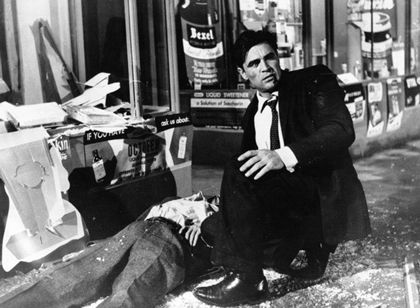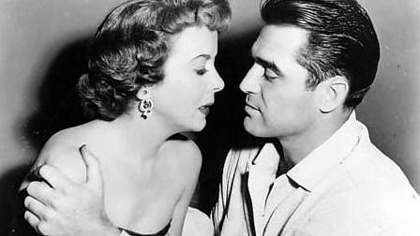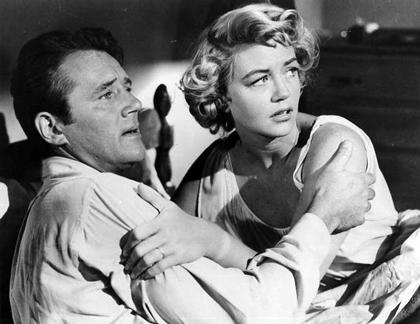
 |
|
|
|
The evocatively titled Private Hell 36 is a low-key police corruption noir that evokes some of the feeling of seedy pulp fiction of the 1950s. Not quite big enough to float a major production company, the shrewd and creatively ambitious Ida Lupino augmented her for-hire acting assignments by launching the Filmakers Company with her partner and husband Collier Young. Ida was soon performing directing duties for the artistically minded film unit. Filmakers made the first Hollywood film to fully examine the psychological effects of rape (Outrage); Ms. Lupino had already directed the low budget but top-notch noir suspenser The Hitch-Hiker. 
Private Hell 36 came near the end of the line for the Filmakers Company. Collier Young and Ida Lupino had both divorced and remarried, yet were still a working team, together with their new spouses. The show was written several years earlier and put into production during a spate of 'bad cop' movies like Shield for Murder, Pushover and Rogue Cop. Ms. Lupino decided to go with an outside director, and hired Don Siegel straight from the set of Allied Artists' Riot in Cell Block 11. The script top-loads an action scene but spends most of its running time developing its characters. Restless L.A.P.D detective Cal Bruner (Steve Cochran) arrests a burglar in a pharmacy; back at headquarters Detective captain Michaels (Dean Jagger) assigns Cal his partner to trace $300,000 in money stolen from a courier in Chicago. A traced $50 bill leads them to Lilli Marlowe (Ida Lupino), a lounge singer in a bar; she reluctantly accompanies Bruner and his married partner Jack Farnham (Howard Duff) to the racetrack in the hopes that she will recognize the man who gave her the tip. The cop and the singer fall into an uneasy romance, stifled by Lilli's determination to find a wealthier man. Cal's chance comes when he and Jack chase down the thief and recover almost all of the stolen cash in a suitcase. Before Jack can stop him, Cal has stuffed $80,000 into his pockets. Cal turns in the rest of the money and Jack stays mum out of loyalty to his partner. Capt. Michaels offers his congratulations and Cal and Lilli celebrate with Jack and his wife Francey (Dorothy Malone). Jack is soon behaving erratically, convinced that he'll be caught and his life ruined. Cal is making plans to run away to Mexico with Lilli when he receives an unwanted telephone call -- from the dead thief's partner, who wants his money and threatens blackmail. Jack wants to confess all before things get out of hand, but Cal is determined to do things his way ... with a gun. 
It seems that a wild movie could be made about the filming of Private Hell 36: who ever heard of divorced producers and their new partners trying to make a movie together? In his memoirs Don Siegel claimed that artistic differences among the various 'Filmakers' led to constant bickering on the set, and further complained that 'drinking issues' affecting some of the actors blocked his directing efforts. But the film's laid-back performances seem properly geared to this seedy L.A. crime story, with its very '50s attitude toward corruption. American movies (and culture) worship money despite its corrupting influence. Surrounded by unearned wealth, the hardworking Cal Bruner cannot resist what he thinks is a ticket to his dreams. Family man Jack Farnham can only see disgrace and the ruin of everything he holds dear, but he'd never consider informing on a friend. Lilli Marlowe tries to steer Cal away, as if remembering earlier boyfriends that went bad trying to keep her in furs. All this moral turpitude on the personal level now seem almost quaint, considering the level of corruption in L.A. city government at the time, with the police colluding with organized crime at the executive level. Ida Lupino and Steve Cochran's winning noir couple evokes the working class desperation of '50s pulp writers like Jim Thompson. Lupino is very attractive in her 40s, and her mature character is not a conventional femme fatale. Steve Cochran, on the other hand, was a true babe magnet of his day. They may have called him swarthy or oily, but whatever pheromones he gave off exude masculine pride. The script accepts the fact that Lilli and Cal are truly in love, but in a situation that spells nothing but trouble. The low budget actually enhances the film's appeal, even though the meager sets could have been rented from a studio specializing in TV work -- few if any rooms even have a window. Siegel's outdoor scenes may all have been shot silent, at the Hollywood Park racetrack and in Griffith Park's Bronson Canyon. Today's Hollywood dog-walkers will recognize exactly where the car wreck scene was filmed. When the detectives run through the brush collecting wind-blown $50 bills, most viewers will feel exactly as Cal Bruner does: I picked it up, I'm keeping it. Siegel stretches his action scenes as best he can, leading up to a fairly complex final shoot-out. One must do some thinking to figure out exactly "who knew what, when" before the final showdown in the trailer park. Cal is looking for a Mexican hideaway and Jack would surely like to get his family out of their cramped apartment and into a real house, but the rows of rootless little trailers seem to represent the kind of home where a disgraced cop might end up living. The one numbered #36 is the private hell where Cal has stashed his loot. 
With Private Hell 36 The Filmakers Company was pretty much finished. It's possible that their releasing deal with Howard Hughes (for whom Ms. Lupino acted in On Dangerous Ground) finally ran its course. Don Siegel went back to Allied Artists and An Annapolis Story and Invasion of the Body Snatchers. Through all of these pictures Siegel hired a USC theater arts student named Sam Peckinpah, as an all-round assistant given the credit dialogue director. Olive Films' Blu-ray of Private Hell 36 at last receives a worthy video presentation. Burnett Guffey's no-frills cinematography has little opportunity to add glamour or expressive visual effects, but it captures perfectly the sensation of stepping into a cheap bar during the heat of an L.A. summer. This is the first time that Private Hell 36 has been presented at a correct matted widescreen aspect ratio, a decision that finally gives its scenes some compositional balance. Previous TV prints and a 1990s laserdisc showed the whole frame, which seemed to have acres of boring head and foot room above and below the relevant action. Olive deserves special commendation for taking the trouble to attend to important details like this. A recent interview with acquisition officer Frank Tarzi corrects an assumption I've probably made more than once: although Olive uses some HD transfers already made by Paramount, it transfers most of its titles itself. Olive does much more than simply package licensed transfers. The stylish graphics and typography on the disc packaging are also a new look for Olive.
On a scale of Excellent, Good, Fair, and Poor,
Private Hell 36 Blu-ray rates:
Reviews on the Savant main site have additional credits information and are often updated and annotated with reader input and graphics. Also, don't forget the 2011 Savant Wish List. T'was Ever Thus.
Review Staff | About DVD Talk | Newsletter Subscribe | Join DVD Talk Forum |
| ||||||||||||||||||